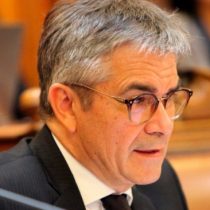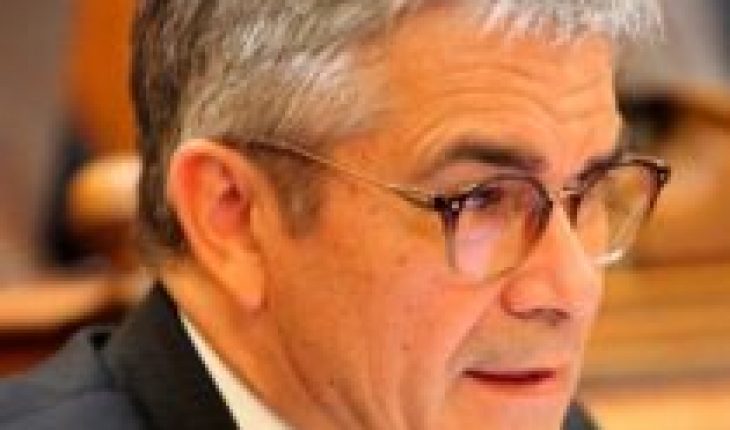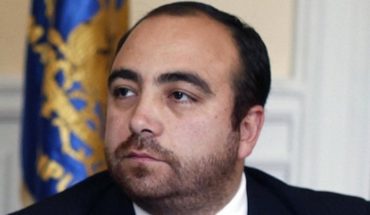
good! We start the week with the pandemic unrooted, another fight over a third withdrawal from the AFP and uncertainty about the elections for the Constitutional Convention. The good news is that vaccination is progressing and that’s what gives us hope that there’s light at the end of the tunnel.
A parish notice before you leave: If you’re reading this on a Monday, make sure you have it first on Sundays and subscribe HERE. The same if someone shared this newsletter or note to you, be sure to receive it every Sunday night. And, if you’re already enrolled, you can share it with a friend, family member, or colleague.
1
1- THREE QUESTIONS TO MARIO MARCEL: “A CRISIS IS THE MOST ACIDIC TEST POSSIBLE FOR INSTITUTIONS”
The week ending, the Central Bank (BC) presented its first Monetary Policy Report of the year. The report improved the outlook for 2021 and slightly moderated the expansional bias of monetary policy. But BC President Mario Marcel warned that the recent rise in new COVID infections and renewed and strict confinement measures will weaken recovery in the short term.
The March IPoM was one of the last of Marcel’s tenure in charge of the BC and has probably been the most difficult period in Chile’s modern history: the social outburst and the pandemic. In this brief interview, the economist talks about how institutionality responded, shares a deeper analysis of the state of Chile’s economy, and reveals who designed the new BC logo, in addition to the first thing he reads in the mornings.
-Mario: the good, the bad and the worrying of the IPoM.
-The good thing:
That the economy recovered from the deep contraction of the second quarter of 2020 with greater dynamism than expected, so that 2021 starts with a greater than expected strength. This reveals not only the impact of crisis containment measures, but an important capacity for adaptation to the demands of social esttainment. This is very relevant for the implementation of new health restrictions in response to the increase in Covid-19 contagions in the country.
It is noted that the great expansional effort of public policies and the way in which they have been articulated – direct transfers to households and credit stimulus to the most affected SMEs – managed to contain the greatest risks envisaged at the start of the crisis. In the case of companies, two out of three have managed to resume operations, after stopping their activities at the worst of the pandemic.
That, with the advancement of vaccination and the improvement of external conditions, a path of exit from this crisis begins to be set up.
-The bad:
That, although we are dating, we have suffered a deep recession, both globally and locally.
The severe impact the crisis has had on the labour market and the lag with which it is recovering. This is associated with certain characteristics of the Chilean labour market on which the BC had been alerting, such as the high turnover and proportion of forward contracts, as well as the weakness of social protection systems, which, beyond the Employment Protection Act, forced the use of ad hoc mechanisms for transferring resources to households , who operated with excessive lag for the immediate shock they received.
Relying so much on the evolution of a virus that is still little known and whose evolution is difficult to predict and that hits countries with new waves affecting all dimensions of life, including the economy. Although vaccine availability is a major step forward, disputes between countries over access to vaccines, the emergence of new strains of the virus, and the poor development of more effective treatments indicate that there is still plenty to do to fully master the health angle – the main one – of this crisis.
-The worrying:
The growing heterogeneity evident between countries, sectors and socio-economic groups in the evolution of the crisis can lead to new factors of instability, bottlenecks and social costs even at a recovery stage.
The availability of liquidity generated by the withdrawals of planned savings in Chile creates a false sense of abundance, when all economic operators – companies, households and government – are suffering a significant deterioration in assets.
The risk of aftermath of the crisis reducing our already limited capacidad of growth in the medium term, when what we need is to raise it, to recover the large gap – close to 10% of GDP – that ensafted, between the social crisis and that of covid-19, with regard to the trajectory of our economy.
-What did you think of the reaction of analysts and the market, what did they get right about and what were they wrong about?
-In general, we do not comment on market projections, but only try to record and systematize them. From that perspective, our projections are within market ranges and, probably that’s why overall the reviews have been quite positive.
-This is his last year in charge of the BC and has probably been the most difficult period in modern Chilean history. Please give us your analysis of how institutionality responded and things to improve about the discussion on the new Constitution.
-This is a very relevant question, precisely because we will soon have a Convention chosen and mandated to generate a new Constitution, which gives the framework for the institutional development of the country. I believe that the experience of the last year and a half is revealing the value of institutions, because a crisis is the most acidic test possible for institutions.
In this test, I believe that there are institutions that have responded well and have probably been valued. Public health is one of them, which was so criticized from different angles for several decades, and has now demonstrated its ability to serve a large pandemic through coordinated management of the public and private network, as well as the vaccination process. I have no doubt that much more attention will be paid to this sector from now on.
I believe that basketry insurance should also be assessed, which, with some modifications, was able to prevent more than 700,000 from losing their jobs and being able to rejoin their work in a high proportion.
Even if the opinion comes very closely, I believe that at the economic level the role and capacity of the BC is valued, which, using the powers that gives it its autonomy, was able to act with great speed and capacity for innovation, applying more than 20 measures to increase monetary momentum, facilitate the functioning of markets and recover policy space. Looking at it further inside, I have been impressed by the professionalism and capacity of the Bank’s staff, who were able to implement all this even with telework, as the whole country has done.
Finally, I believe that we need to think about the institutions we lacked, especially a more comprehensive, inclusive and coherent system of social protection, which for many countries has managed to significantly limit the social costs of this crisis.
-Bonus Track: what’s the first thing you read or listen to to find out and who chose the new BC logo
-In addition to the local media, I follow the New York Times, the Financial Times, the Guardian and El País daily, as well as the most immediate information that Bloomberg gives during the day.
The Bank’s new logo is part of a set of initiatives aimed at broadening our communications in a way and in a way that reaches a wider audience and more intensively using digital media. In fact, with this IPoM we introduced about ten innovations in this field, among which stands out the new graph, which seeks to adapt better to digital media. All this has been defined by the Council, as part of the Strategic Plan 2018-2022, with the support of a small internal professional team and external supports when necessary.
2
2- THE STRONG DISCOMFORT INSIDE CODELCO BY THE ARRIVAL OF FELIPE LARRAÍN IN THE DIRECTORY
What happened. On Wednesday, on the eve of the long weekend of Easter and with everyone concerned about Covid’s case break, the Government announced the appointment of former Finance Minister Felipe Larraín to Codelco’s board. It was in place of the current owner of the Treasury, Rodrigo Cerda.
Disbelief and discomfort within Codelco and on the market. At least two directors contacted by El Semanal “couldn’t believe it.” Former state miners described them as “unpresentable” and as a “terrible sign.” He is blamed for the decapitalization of the company during the first government of Sebastián Piñera. They recall that, between late 2009 and 2014, when Larraín had his first step in the Treasury, Codelco’s debt nearly tripled, while surpluses were among the highest in its history: $24.525 million.
The deafness of the elite. One of Chile’s leading economists with cross-cutting ties to the centre right and Concertación said it was hard to understand why an ex-minister who was forced to resign during the social outburst and whoand many see him as responsible for “a great disaster and a great crisis.”
His controversial arrival in Cencosud. Larraín took over as director of Cencosud in April 2020. At the time, it was questioned not only that this occurred just six months after he left the cabinet (revolving door), but also that he had no experience in retail.
It should be noted that, in the days leading up to his arrival, Cencosud approved a dividend that almost tripled the legal minimum, within a few days of having taken over the Employment Protection Act, through which the workers themselves, through their cessantía funds, and the Government, with money from all Chileans, take over some of the salaries of the firm’s workers. Within a few days, he had to reverse the decision by the strong pressure, among others, of the minister himself who replaced Larraín in the Treasury: Ignacio Briones.
3
3- RICARDO LESSMANN and THE SUNSET OF GILDEMEISTER, CHRONIC OF AN ANNOUNCED CRISIS
Automotores Gildemeister joins Latam and CorpGroup Banking and becomes the third Chilean company to fall by default in less than a year. On Thursday, Gildemeister announced that he was awarded Chapter 11 of the U.S. Bankruptcy Act, and that he has already reached an agreement with creditors, consisting of a deep restructuring that will reduce his debt by between $200 million and $300 million. I mean, the bonistas are going to suffer. However, from the companies they emphasize that Chilean banks and suppliers will not be affected. Santander was the most exposed.
The details of the operation. Minvest, the company that leads Ricardo Lessmann, is taken out of control, leaving the engine in the hands of two U.S. investment funds that control 75% of the 700 million upstream debt: the Elliot Management vulture fund, which manages US$ 34 billion and led the fight with the Argentine government over the payment of debt for unpaid bonds during the government of Cristina Kirchner; and the Bain Capital fund.
Chronicle of an announced death: bad decisions and JP Morgan’s questioned advice. The company’s financial problems – which has Hyundai’s representation in Chile and Peru – began in 2013 and the detonator was when, in full swing, Lessmann and his partners issued bonds totaling US$ 700 million while withdrawing more than half of the dividend profits. Added to this was the catastrophic expansion to Brazil and the loss of dynamism of the economies of Chile and Peru. There were at least two restructurings. At the time, bonds were worth less than half their value. The fatal blow was the combination of the social outburst, pandemic and falling weight that hit the margins. Negotiations were led by investment bank Rothschild.
4
4- OPERATION TO RESCUE GONZALO VIAL: CHL AND THE USUAL SUSPECTS.
The case of the $290 million debt that made Chile’s largest banks nervous. The debt was from companies controlled by Gonzalo Vial Concha, son of Gonzalo Vial, founder and controller of Agrosuper, but who is estranged from the family business. Vial Concha was also involved in the Caval Case, where he ended up falling victim to a million-dollar scam.
Santander Chile hit the table a few weeks ago and demanded that it be paid the $60 million owed to it. Vial Concha had rescheduled the debt six times. Soon, the rest of the banks threatened to follow Santander’s example and negotiations began.
The last-minute lifeguard. The bailout was made by CHL Capital, the controversial investment manager founded by Canio Corbo Atria, Tomás Hurtado and Nicolás Larraín. All three were linked in the Cascading Case, so they had to pay a heer fine applied to him by the SVS. They participated in one of the million-dollar illegal operations that favored Julio Ponce.
The questioned role of Canio Corbo and his father. In two of the banks, they question their involvement in the operation. Corbo is the nephew of Vittorio Corbo, former president of the Central Bank. But even more relevant is that he is the son of Canio Corbo Loi, director of Agrosuper. The fear of banks has always been for Vial or his family to benefit from the agreement. For some, the signed pact does just that.
Corbo’s associates also have powerful lineages. Tomás Hurtado is the son of businessman Nicolás Hurtado Vicuña and Nicolás Larraín is the son of former RN President Carlos Larraín. The Third reported on Sunday that CHL had an interest in Vial Concha and its companies not falling: their funds have financed business operations and risked million-dollar losses.
The terms of the rescue. Banking recovers 40% of the $290 million immediately and another 25% eventually in six years that would come out of the dividends it pays Agrosuper, of which Vial Concha has 25%.
A message from Huawei
Huawei: a benchmark in innovation and intellectual property
Technology giant Huawei published a new White Paper, a document describing the history of the company’s last 30 years, as well as the long-term commitment to respect, protect and contribute to intellectual property.
In this context, Huawei revealed that by the end of 2020 it accumulated more than 100,000 patents active worldwide. Also, announced that for each multimode 5G smartphone, Huawei will set a reasonable percentage commission on the phone’s sale price. Making public the licensing structure for 5G essential patents seeks to promote the adoption and widespread use of standards designed to ensure interoperability, reliability and transparent competition.
5
5- CHART OF THE WEEK: WHAT WE SPEND OUR AFP WITHDRAWALS ON
A significant fraction of AFP withdrawals have not yet been spent. The BC estimates that part of the amounts actually withdrawn were allocated to the consumption of goods and the payment of debts, but almost two-thirds remain in people’s bank and savings accounts. That makes you think that consumption will have a high expansion this year.
6
6- NO TACOS OR TIES
–The anger of the BC with the banks. The BC is trying to internationalize the weight and, to do so, has asked the agents to close the market later. Today, it’s done at 13.30 a.m. and the idea is that it’s 3:00. The main players are banks, AFPs and insurers. In the market, they explain that now the operators are going to have lunch and do not return and if there are any AFPs that want to do coverage it has no tips after that time.
The defense of the banks. They defended themselves by saying that the BC asked them for data for the close of the dollar observed at 15.00 so it could not be done. But the BC notes that as far as November last year the Market Committee established that sending information for the calculation of the Observed Dollar is not a regulatory impediment to continuing to trade FX during the afternoon.
–The new edge in the controversial and million-dollar tender of the Civil Registry reaches the inner circle of Sebastián Piñera. Let’s remember there’s about $500 million at stake. We’re talking about the tender to make IDENTITY cards and passports. It is the largest loot in the State of Chile and there is a lobby unscapped to stay with it. The deadline for bidding was on Monday and the health emergency was postponed again. Now the new deadline is until April 19.
Carmen Ibañez’s mysterious and unknown role. They call it “the gift” by Sebastián Piñera. The former deputy was ambassador to Greece during her first step in La Moneda and is currently culturally attached in Argentina. Sources who know in detail the bidding process claim that it was Ibañez that made the initial link between Gemalto (a company that is now part of the proposal prepared by Sonda/Thales) and his son, Joaquín Godoy. Godoy, a former RN deputy, is the leading lobbyist operating on behalf of Sonda/Thales. Ibañez introduced two well-known Argentine political operators, Efraín Vásquez and Rodolfo Eyben, who worked with Gemalto, to work with Godoy on the proposal.
As we have been reporting in this space, the current contract is between the French company Idemia (ex-Morpho). But the bidding process has been plagued by operations suggesting a relationship between La Moneda, the Civil Registry and Sonda to leave out the incumbent. Sonda had that contract before Idemia, his controller, Andrés Navarro is a friend of the President, and wants to have him again. In the industry, they claim that Sonda partnered with Thales/Gemalto because he does not have the technical expertise. There are at least eight companies interested in bidding. In addition to Idemia and Sonda, among those who have a chance to win it are germany’s Veridos and Spain’s Indra, although there are some who believe that at the end of the day Indra will not submit an offer.
There is consensus among several of the firms interested in the process that La Moneda wants to rush the process at all costs, to settle it before the next government arrives. And that is why in part the technical requirements were reduced in the basis of the tender. Sources close to Idemia say the French are going to have a tough fight, but they know it’s all uphill. They point to the mysterious role of Juan Bennett, former director of the Registry during the dictatorship and exsocio of Sonda. They also point to the role of the unknown consultancy El Trébol and its questioned audit. The Contraloria is already investigating. This story is still in development.
–The National Economic Prosecutor’s Office (FNE) raised no objections and China went on to control the monopoly on electricity supply of 57% of the chiwhen taking control of CGE and Chilquinta. The FNE did not object and apparently did no geopolitical analysis of the consequences. Even those who supported the operations question the regulator’s actions. Those who oppose and claim that the FNE okey leaves the State of Chile in a vulnerable position are even tougher:
“The FNE is certainly a false step, but more than that, it is a good and sad reflection of the environmental environment, starting with the current government but certainly not ending in it. The country’s potential, which is extraordinary, is constantly suffering the consequences of this,” is the analysis of economist Manuel Cruzat.
Which reveals the collapse of Archegos Capital from the market. The investment fund created by Bill Hwang handled about $10 billion of his personal fortune and that of his family. But, according to The Wall Street Journal, his total possessions that he got rid of are approaching $30 billion.
Over the weekend, the Financial Times published a note revealing that the collapse of the opaque investment fund pocketed losses of more than $50 billion and that the fund was leveraged by 500%. Two of the world’s largest investment banks, Swiss Credit Suisse and Japanese Nomura, said they could suffer large losses. Again, the lack of regulation and transparency in the major operations of Wall Street, London and other major financial centres is called into question.
Millionaire cryptocurrency investor Mike Novogratz said on Twitter that the fund explosion could represent “the most spectacular loss of personal wealth in history,” he said on Twitter
–The dramatic increase in poverty in Argentina. Poverty increased from 35.5% to 42% of Argentines by 2020. That means it affects 19 million Argentines and that, in a year, 3 million poor people were added. It was reported by the Indec this afternoon. The determining factor was the pandemic. In three years, poverty increased by 8 million. Since 1983, poverty has not dropped from 25%. It’s neither macrism nor kirchnerism. The problem is politics.
There is concern in the Government about the figures and the impact it could have on the October parliamentary elections. The average salaries are between 30 thousand and 50 thousand Argentine pesos per month, currently equivalent to between 200 and 330 dollars.
7
7- AGENDA OF THE WEEK
It is a relatively quiet week, with few events or reports in folder.
Wednesday
8
8- RECOMMENDATION: THE INTELLECTUAL DEBATE AROUND POPULISM
It was recommended to me by Spain-based Chilean journalist John Muller. And it’s an extraordinary summary of intellectual debate around inequality and populism. Muller argues that the economic hypothesis of populism holds that populism grows because it is more effective than anyone exploiting the economic anxiety created by the phenomena associated with globalization among ordinary men. Toni Roldán’s article questions her.
Well, we did the first workshop in El Semanal and survived to tell the tale.
I want to thank all the people who signed up and participated. He’s the first of many. Keep an eye out for this space for news of the next one.
That’s how far we’ve come this week. Remember that if you have any comments or information to share with us, write to me ivan@elmostrador.cl or follow me on Twitter @ivanwese and Instagram @ivanwese. Sign up for El Semanal HERE.





